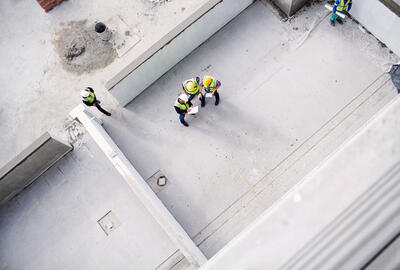If you have engineering skills and are good at project management, it’s only a matter of time before someone suggests a career in project engineering to you. So what does a career in project engineering actually entail?
Project engineers are the people who keep construction and engineering projects on time and on a budget, as well as monitor for fitness of purpose along the way.
They are the ones responsible for the day to day running of engineering schemes, making them perfect careers for engineers with excellent time and people management skills as well as a talent for practical problem solving and solutions implementation.Not all project managers are engineers - this article explores other project management roles.
They work closely with other levels of management such as Business Development teams to scope out prospective projects, agree on timings and service level agreements with clients, negotiate with third party contractors and manage the creation and delivery of detailed project plans. Ultimately, bringing in a profitable, successful project on time and to the satisfaction of the end user is the Project Engineer’s responsibility.
What are a project engineer's duties?
So what does a project engineer actually do on a day to day basis? In no particular order, key responsibilities are likely to include:
- Translating client requirements into practical terms that can be implemented by a team
- Prioritising and organising project tasks into the required timeline
- Ensuring the project meets its deadlines at each stage
- Maintaining a clean health and safety record and overseeing the resolution of any problems
- Making sure all legal requirements are adhered to
- Identifying problems with the project, taking the lead on developing solutions and ensuring solutions are implemented
- Listening and responding to team and client requests
- Running regular team meetings and maintaining team activity and morale
- Liaising with third parties such as external contractors around time scales and working practices
In order to carry out these tasks successfully, Project Engineers will need to have several years engineering experience as well as a high level of discipline and organisational ability. Successful employees will also need the ability to communicate with and manage all levels of staff effectively, from temporary site labourers to senior client executives.
Confidence and initiative are pre-requisites too. Project Engineers are likely to have good engineering qualifications, and often further relevant training in technical skills such as CAD and management techniques.
Where do project engineers work?
Project engineers are likely to find themselves working on site regularly, though they may nominally be office-based. Visits to clients, contractors and sites will happen on a regular and frequent basis, and may mean working hours going past the standard 9-5.30 where required, as well as travelling away from the home base.
Project engineer career progression.
In terms of career progress, Project engineers might carry on into senior management, or alternatively, pursue a career as a freelance project consultant if a career focused on management does not appeal. Alternatively, excellent project management skills are always valued in the workplace, if a career outside of engineering beckons further down the line.






